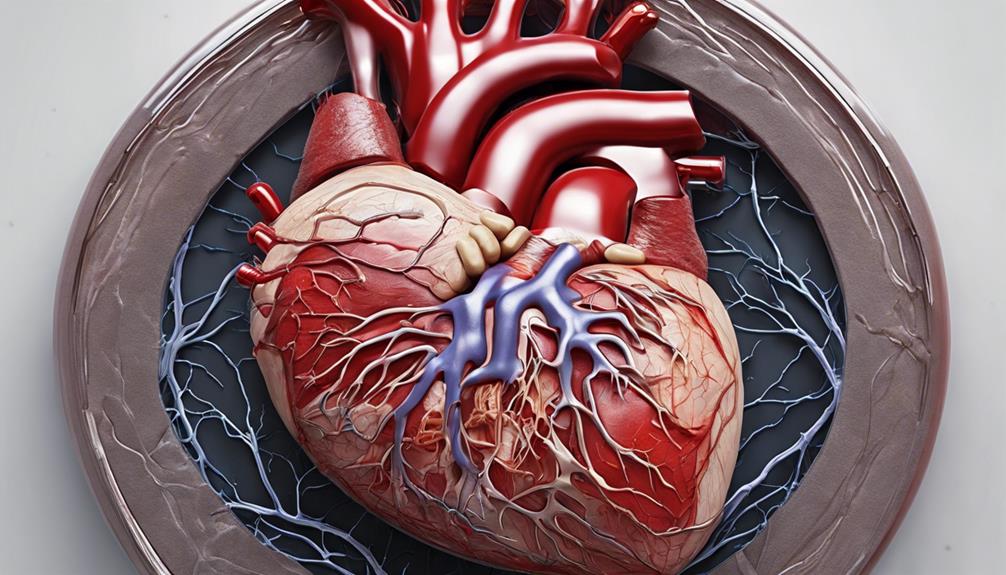Picture a heart that is having difficulty pumping blood through narrow passages, with each beat fighting against limited circulation. Regrettably, this situation is common among veterans who were exposed to Agent Orange.
The correlation between this herbicide and ischemic heart disease is a topic that demands attention. As we explore the implications of this connection, we uncover not just medical intricacies but also the human stories behind each diagnosis.
Understanding the impact of Agent Orange on heart health could pave the way for broader discussions on toxic exposures and their lasting effects on those who served.
Key Takeaways
- Agent Orange exposure increases IHD risk
- VA benefits available for affected veterans
- Disability ratings based on severity and symptoms
- Nexus letters crucial for compensation claims
Overview of Ischemic Heart Disease
Ischemic heart disease, also known as coronary heart disease, arises from the narrowing of heart arteries, which diminishes the flow of oxygenated blood. Symptoms of ischemic heart disease encompass angina pectoris, heart palpitations, extreme fatigue, and lightheadedness. If left unmanaged, complications such as congestive heart failure and heart attacks may ensue. To diagnose ischemic heart disease, healthcare providers commonly employ tests like EKG, stress tests, cardiac catheterization, and CT scans.
When facing ischemic heart disease, embracing lifestyle modifications becomes paramount. These changes typically include regular exercise, adherence to a heart-healthy diet, and diligent medication management. By making these adjustments, individuals can better manage their condition and potentially improve their quality of life. Understanding the diagnostic procedures and the importance of lifestyle changes can empower both patients and caregivers in the journey of dealing with ischemic heart disease.
Link Between Agent Orange and IHD

Exposure to Agent Orange during the Vietnam War significantly increases the risk of developing ischemic heart disease due to the presence of dioxin in the herbicide.
- VA Benefits: The VA has acknowledged the link between Agent Orange exposure and ischemic heart disease since 2010, making veterans eligible for benefits related to this condition.
- Health Risks: Agent Orange, a herbicide used in the Vietnam War, contains toxic chemicals like dioxin that have been associated with various health issues, including ischemic heart disease.
- Association with Cardiovascular System: Millions of individuals, including both service members and civilians, were exposed to hazardous substances like Agent Orange, leading to potential cardiovascular complications such as ischemic heart disease.
- High-Risk Group: Veterans who were exposed to Agent Orange are at a heightened risk of developing ischemic heart disease, emphasizing the critical need for monitoring and early intervention in this population.
The evidence clearly indicates a strong connection between exposure to Agent Orange and the development of ischemic heart disease, underscoring the importance of recognizing and addressing this health concern, particularly in those who served during the Vietnam War.
VA Disability Ratings for IHD
When determining VA disability ratings for ischemic heart disease, factors such as workload METs, heart failure symptoms, and ejection fraction play a crucial role. The severity of these symptoms can lead to VA ratings of 10%, 30%, 60%, or 100%. Workload METs levels are indicative of activity levels and are considered when assigning disability ratings. Specific heart surgeries like transplants or pacemaker implantations can result in temporary 100% disability ratings. Symptoms such as breathlessness, fatigue, and arrhythmia are also taken into account for determining the disability rating. Below is a table summarizing the key factors influencing VA disability ratings for ischemic heart disease:
| Factors | Impact on Disability Ratings |
|---|---|
| Workload METs | Indicates Activity Levels |
| Heart Failure Symptoms | Severity of Symptoms |
| Ejection Fraction | Heart Function Assessment |
| Heart Surgeries | Temporary 100% Ratings |
Obtaining VA Compensation for IHD

For veterans seeking VA compensation for ischemic heart disease, understanding the eligibility criteria and documentation requirements is crucial for a successful claim. Here are some key points to consider:
- Presumptive Eligibility: Veterans exposed to Agent Orange may qualify automatically for VA compensation related to ischemic heart disease based on specific service locations and timeframes.
- Nexus Letters: If veterans don't meet the presumptive criteria, they can still apply for VA compensation by providing nexus letters that establish a link between their ischemic heart disease and toxic exposure.
- Diagnostic Codes: VA rates ischemic heart disease severity using diagnostic codes and symptom assessments to determine the level of compensation.
- TDIU Benefits: Total Disability Individual Unemployability benefits are available for veterans unable to work due to service-connected ischemic heart disease, offering additional financial support.
Understanding these aspects can help veterans navigate the process of obtaining VA compensation for ischemic heart disease related to Agent Orange exposure.
Research on Herbicides and IHD
Research on herbicides, including Agent Orange, has established a clear link to the development of ischemic heart disease. Studies, such as the Health and Medicine Division's report, have provided evidence supporting the association between herbicide exposure and the increased risk of ischemic heart disease.
The VA recognizes this connection, emphasizing the importance of providing disability benefits to individuals affected by Agent Orange exposure and subsequent heart conditions. Ongoing research continues to delve into the specific health effects of herbicides like Agent Orange, focusing on their impact on heart disease development.
Regulations and guidelines are in place to address the potential health risks associated with herbicide exposure, particularly concerning conditions such as ischemic heart disease. By acknowledging the relationship between herbicides and heart disease, the medical community and regulatory bodies aim to enhance understanding, improve care, and ensure appropriate support for those affected by such exposures.
Frequently Asked Questions
What Is the Main Cause of Ischemic Heart Disease?
The main cause of ischemic heart disease is the narrowing of coronary arteries, reducing blood flow to the heart muscle. This condition typically arises from the buildup of cholesterol plaque in the arteries, hindering blood and oxygen supply to the heart.
The primary factor behind ischemic heart disease development is the restriction of oxygenated blood flow due to arterial blockages. It results from atherosclerosis, where plaque accumulation in the arteries limits blood flow and oxygen delivery to the heart muscle.
What Is VA Disability Rating for Ischemic Heart Disease?
Sure thing!
We rate VA disability for ischemic heart disease based on symptom severity and impact on daily life, ranging from 10% to 100%. Factors like workload METs, heart failure symptoms, ejection fraction, and medication needs influence the rating.
Symptoms like breathlessness, fatigue, arrhythmia, and limited physical activity also play a role.
Surgeries like transplants or pacemaker implantation can result in temporary 100% disability ratings.
Can Agent Orange Cause Ischemic Heart Disease?
Yes, Agent Orange exposure can cause ischemic heart disease. Studies have shown a link between exposure to Agent Orange and an increased risk of developing this condition.
The chemicals in Agent Orange can lead to narrowed coronary arteries and restricted blood flow to the heart, resulting in ischemic heart disease.
Veterans who were exposed to Agent Orange during their service may be eligible for VA disability benefits for this condition without needing to prove a direct link.
What Should You Avoid if You Have Ischemia?
To manage ischemia, we should:
- Avoid smoking
- Limit high-sodium foods
- Reduce alcohol intake
- Manage stress
- Engage in moderate physical activity
These actions can help maintain blood vessel health, blood pressure levels, and heart function, reducing the risk of chest pain and heart-related complications.
Prioritizing these lifestyle choices can support overall heart health and improve outcomes for individuals with ischemic heart disease.
Conclusion
In conclusion, it's ironic that the same herbicide used to defoliate forests during the Vietnam War is now causing heart disease in veterans.
The VA's recognition of the link between Agent Orange and ischemic heart disease highlights the long-term health risks of toxic exposures.
As we continue to research and address the impact of herbicides on veterans' health, it's crucial to prioritize their well-being and provide necessary support and compensation.









